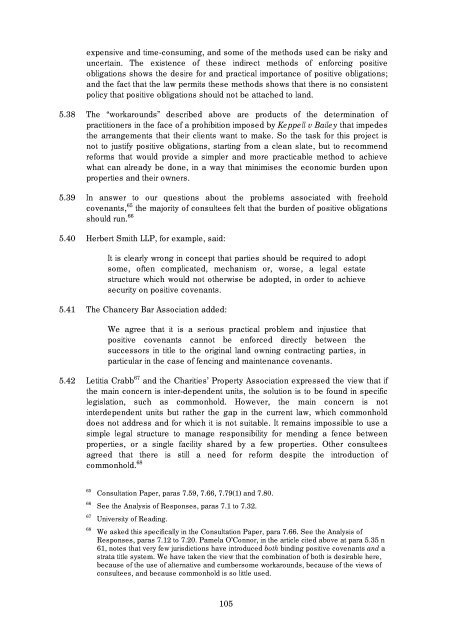Making Land Work: Easements, Covenants and ... - Law Commission
Making Land Work: Easements, Covenants and ... - Law Commission
Making Land Work: Easements, Covenants and ... - Law Commission
Create successful ePaper yourself
Turn your PDF publications into a flip-book with our unique Google optimized e-Paper software.
expensive <strong>and</strong> time-consuming, <strong>and</strong> some of the methods used can be risky <strong>and</strong><br />
uncertain. The existence of these indirect methods of enforcing positive<br />
obligations shows the desire for <strong>and</strong> practical importance of positive obligations;<br />
<strong>and</strong> the fact that the law permits these methods shows that there is no consistent<br />
policy that positive obligations should not be attached to l<strong>and</strong>.<br />
5.38 The “workarounds” described above are products of the determination of<br />
practitioners in the face of a prohibition imposed by Keppell v Bailey that impedes<br />
the arrangements that their clients want to make. So the task for this project is<br />
not to justify positive obligations, starting from a clean slate, but to recommend<br />
reforms that would provide a simpler <strong>and</strong> more practicable method to achieve<br />
what can already be done, in a way that minimises the economic burden upon<br />
properties <strong>and</strong> their owners.<br />
5.39 In answer to our questions about the problems associated with freehold<br />
covenants, 65 the majority of consultees felt that the burden of positive obligations<br />
should run. 66<br />
5.40 Herbert Smith LLP, for example, said:<br />
It is clearly wrong in concept that parties should be required to adopt<br />
some, often complicated, mechanism or, worse, a legal estate<br />
structure which would not otherwise be adopted, in order to achieve<br />
security on positive covenants.<br />
5.41 The Chancery Bar Association added:<br />
We agree that it is a serious practical problem <strong>and</strong> injustice that<br />
positive covenants cannot be enforced directly between the<br />
successors in title to the original l<strong>and</strong> owning contracting parties, in<br />
particular in the case of fencing <strong>and</strong> maintenance covenants.<br />
5.42 Letitia Crabb 67 <strong>and</strong> the Charities’ Property Association expressed the view that if<br />
the main concern is inter-dependent units, the solution is to be found in specific<br />
legislation, such as commonhold. However, the main concern is not<br />
interdependent units but rather the gap in the current law, which commonhold<br />
does not address <strong>and</strong> for which it is not suitable. It remains impossible to use a<br />
simple legal structure to manage responsibility for mending a fence between<br />
properties, or a single facility shared by a few properties. Other consultees<br />
agreed that there is still a need for reform despite the introduction of<br />
commonhold. 68<br />
65 Consultation Paper, paras 7.59, 7.66, 7.79(1) <strong>and</strong> 7.80.<br />
66 See the Analysis of Responses, paras 7.1 to 7.32.<br />
67 University of Reading.<br />
68 We asked this specifically in the Consultation Paper, para 7.66. See the Analysis of<br />
Responses, paras 7.12 to 7.20. Pamela O’Connor, in the article cited above at para 5.35 n<br />
61, notes that very few jurisdictions have introduced both binding positive covenants <strong>and</strong> a<br />
strata title system. We have taken the view that the combination of both is desirable here,<br />
because of the use of alternative <strong>and</strong> cumbersome workarounds, because of the views of<br />
consultees, <strong>and</strong> because commonhold is so little used.<br />
105
















